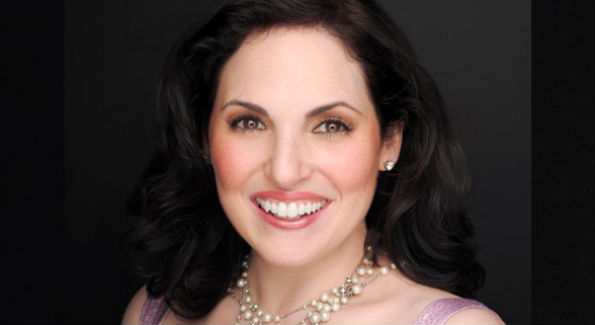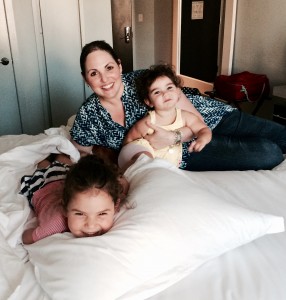Soprano Arianna Zukerman shares her story of courage, faith and her return to performing.
by Patrick D. McCoy

A routine mammogram after Arianna Zukerman’s 40th birthday changed her world forever. (Photo by Tim Coburn)
It is quite meaningful when an artist is willing to open up to a journalist about personal matters they endure long after the curtains close. I met soprano Arianna Zukerman early in my journey to becoming a classical music journalist. Hailing from a world-class musical family, she is the daughter of famed violinist Pinchas Zukerman and flautist and news personality Eugenia Zukerman. The last time we chatted, she was ecstatic about being featured on the Grammy-nominated recording of “Annelies” and performing the New York city premiere of the very work. We never imagined that we would be chatting with the soprano a few years later about tragedy. Recently, we sat down with Zukerman and heard about her cancer diagnosis, returning to the stage and the importance of family.
Washington Life: You were hitting all the high notes, performing all over the place and then a low point came. What were the events leading up to your cancer diagnosis?
Arianna Zukerman: 2014 was a very busy year for me. I had my second daughter in February and by April I had gone back to singing with the New York City premiere of “Annelies” at Lincoln Center, the amazing “Defiant Requiem” at Strathmore and then in Ottawa, Canada and with the Royal Philharmonic in London. And in the middle of it, I scheduled my first routine mammogram; I didn’t think anything of it. I missed what should have been my first mammogram because I was pregnant when I turned 40. It took two mammograms and two biopsies to come to diagnosis. I think a cancer diagnosis is always shocking, but this really blindsided me and my family. Breast cancer is not in my family and I didn’t even feel a lump. The doctors had said that it looked in images like non-invasive, stage zero cancer, but what shocked everyone was that there was an invasive component to my tumor. It turned out that the invasive component was also aggressive so in addition to surgery, chemo was indicated which made treatment longer and harder. In my story, early detection is particularly key because of the aggressive nature of the tumor; had I waited or not acted quickly to get to a diagnosis, the outcome could have been significantly different.
WL: How did your regular routine change?
AZ: Everything changed. The beautiful and unfortunate part of being a singer is that your body is your instrument. My body was under attack and I knew I needed all the physical resources I could muster to fight back. I hunkered down to meet the challenges that came my way. Having two small daughters, I knew I wouldn’t be able to avoid exposure to colds and flu, so anything else I could do to minimize my risks, I did. I took a medical leave from teaching at Catholic University. My chemo was on a three-week cycle, so I taught the students who work with me privately in the two weeks I didn’t actually have the chemo infusion and I didn’t perform. The most difficult piece of this was dealing with how to tell my older daughter who was three years old and how to manage the baby who was six months old. I immediately stopped breast feeding the baby, which remains the most emotionally painful part of my story. With my older daughter, I was honest and straightforward; I let her know when I didn’t feel good and I showed her my scars. My baldness was the hardest piece of it to explain but mostly she just thought it was funny when I had no hair. I found good childcare so that I could rest more often than I am usually able. I’m a hands on mommy so the worst part by far was taking a step back. I had five surgeries between August of 2014 and April of 2015 and not being able to lift my kids post surgery was terrible. I didn’t travel anywhere until I went back to work this past May. Not getting on a plane for almost a full year was kind of a treat. Being a working mom is hard, anyone who does it would attest to that, so I really see the fact that I was at home as a blessing.
WL: Talk to us about the role of your family and friends during this time.
AZ: My family was amazing. My girls have six grandparents and all of them came to visit regularly and helped me with the mundane day-to-day schedule, as well as accompanying me to doctors and to treatment. My sister Natalia made us part of her regular tour stops. My husband was a rock. Our girls reminded me daily why the fight was imperative. My best friends took time out of their lives to come take care of my kids when I was in the worst parts of treatment. My neighbors helped me pick up my daughter at school and they and the parents there regularly brought us meals. My colleagues kept me posted on the comings and goings in the “business” which allowed me to have to balance less and as much as possible take care of myself. Without them all it would’ve been much harder.
WL: What are some of the things that your illness caused you to appreciate more about your gifts as a singer?
AZ: Music is a healing art. I am lucky that it is an integral part of who I am and how I spend my day to day. Illness is a stark reminder that the body can betray you. Making music, particularly singing, is a way to push the body back into health. I play the piano (badly) so I sat with Bach preludes and mucked around at the keyboard with them. I also kept finding my way to the Schubert lied, “An die Musik” which is all about thanking music for transporting us to a better world. I am lucky that I knew where to find music that would help me feel better.
WL: Were you ever concerned about your appearance or the toll that treatment would have on you physically?
AZ: I was and am still concerned about how I look. I believe that women are defined physically by two things; their breasts and their hair. The insidiousness of breast cancer and then its treatment is that it attacks both things. I was worried each time I had to go under anesthesia about being intubated, especially being a singer. I was worried post surgery about getting back to singing and what “support” would feel like. I definitely have had to rework things to find the balance, but I have a great teacher and great coaches and everyone has been understanding and helpful. The world of singing is increasingly visual, so paramount in my transition back to health is slimming down, mostly because I want to, but the work pressure is definitely there. I haven’t been shy about posting bald photos online and have been told I have a nicely shaped head! As my hair grows in, I’m enjoying wearing a Juilliard School baseball cap and I’m finding the glamour in rocking a semi-bald head and wearing a wig well!
WL: How did you use social media to share your story?
AZ: I was initially very concerned about “going public” with my situation. Solo artists are independent contractors relying on reputation and past performance to keep working. I thought if people knew I was sick, it might affect my future ability to work. But I decided that the here and now and getting through the treatment were more important. I also felt that if my story could help one other woman dealing with this and/or inspire one other woman to get her mammogram, it was worth talking about it publicly. I’m generally careful about what I put up on social media and who I let “see” it, but this I made public. It was 100 percent worth it because the outpouring of support, generosity and prayer still takes my breath away. Friends far and wide, including those I had not communicated with in ages, came out of the woodwork to offer me consolation and commiseration and my colleagues were and are the most gracious, supportive people with whom anyone could hope to work. Many, many women told me that my story inspired them to get their mammograms. I healed, particularly from a thirteen-hour surgery, very quickly and the good energy that came my way is, I am certain, part of the reason.
WL: Your schedule is picking back up. How are you feeling and what is next for you?
AZ: I am officially cancer free! It’s kind of surreal but the best thing I could’ve hoped for. I just came back from a week at the Wintergreen Festival and Academy, which has to be this region’s best kept musical secret. I sang orchestrated Schubert songs (including An die Musik) and Barber’s “Knoxville: Summer of 1915.” It was in singing the Barber that I really, finally felt in full control of my vocal faculties. I have come through this and I do believe that difficult chapters in life can serve to make one stronger, smarter and more confident. Although I am still more tired and achy than I would like, I’m on the other side. I have some chamber music to sing in the fall; I’m particularly excited to sing with my good friend, Heather Johnson at the Leaf Peeper Concert series in upstate New York, as well as returning to teaching at Catholic University. As far as I am concerned I can add “cancer survivor” to my list of repertoire and know that it has ultimately made me a better singer, and most importantly, more grateful for everything I have.
After earning degrees in music from Virginia State University and Shenandoah University, Patrick D. McCoy has contributed arts pieces to CBS Washington and The Afro-American Newspaper, among others. He also writes the magazine’s monthly performing arts column “Perfect Pitch.” McCoy may be reached via email at wlperformingarts@aol.com and on Twitter @PatrickDMcCoy





